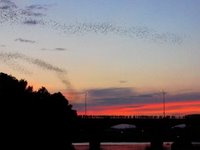"Actor"
Did you know that the late and great Pope John Paul II actually wrote poetry in his 20's? I found a few, and I'm giving my own interpretation of one short piece titled Actor. The Pope, then writing as Karol Wojtyla, was also a stage actor.
Actor by Karol Wojtyla
So many grew round me, through me,
from my self, as it were.
I became a channel, unleashing a force
called man.
Did not the others crowding in, distort
the man that I am?
Being each of them, always imperfect,
myself to myself too near,
he who survives in me, can he ever
look at himself without fear?
The first line has an innate sense of some force that is about to come out roaring. That’s how the r’s in grew, round and through evoke for me. And the full-bodied assonance of the vowels in them gives a solidity to the source of that roar – something big. The repetition of me gives some emphasis to the self of the narrator: is there a multitude of himself inside of the me?
The nasals in the first half of the third line and at the beginning of the second half of it soften the anticipating roar, I feel. The susurration in the second half of the same line gives the impression of some strong wind or breath.
The line breaks at force, but it doesn’t end with it as a final word for the line or as an end-stop. This line is a run-on or enjambment, with just two words called man in the following line. And this two-word line has a very powerful end-stop. Why? Just read the line
I became a channel, unleashing a force
Make yourself pause for just a bit at the end, and then read
called man.
giving equal stress to both words.
Did not the others crowding in, distort
Notice the t and d sounds there? It sounds like a lot of people – multifarious me - are banging or thumping, doesn’t it?
The next line
the man that I am
makes me visualize the speaker trying to calm the crowd: the nasals in the stress words are very strong.
In “Being each of them, always imperfect,” the speaker speaks a little faster. Notice the pairs of non-stresses between each stressed syllable, al in always and per in imperfect. The reading of them speed up a little before the reader reaches the coming stressed syllables. It’s funny here: the rhythm would have been perfect if there was one more stress word oe syllable placed at the end of the line. Is the poet trying to imply something?
More nasal sounds in the next line, but these are rather understated, sounding as if the speaker is lowering his voice and at the same time shushing the excited crowd. The word near is significant here; there is a repeat of the same rhyme in the final word of the entire poem: fear.
myself to myself too near,
In the first half of the poem, the narrator is always referring to himself, with lots of me, myself, I am. Notice the first repetition of his self in me in the 1st line, giving some emphasis to the self of the narrator, and the final one in myself, near the end of the poem. And in between these repetitions is myself split up into my self, in line 2 – a division of the narrator into separate beings? Into a crowd of himself (or selves)? Only in the last two lines does he give over to someone other than himself; the surviving self, the remaining self.
The poem here uses rhymes to link man in 4th line to am in 6th line; force and distort are near rhymes. The word ever in the penultimate line points back the reader to the second line with the rhyming were. Near and fear in the last 3 lines close the poem.
I notice that the construction of the lines are very consistent. The lines 1,3,5 and 7 have a comma in each.
I don't know if the Pope when he wrote Actor actually intended such a reading. Anyway, the translator must have done a good job with it.
(This posting actually first appeared in my personal blog http://leonwing.blogspot.com)
Labels: leon's choices

